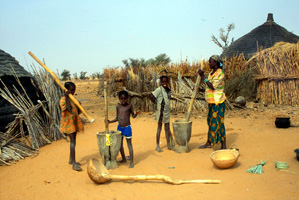
Millions are put at risk as a result of last year’s droughts and the long-term effects of previous food crises in Niger. Credits: Caritas
Caritas says the food crisis in Niger and other parts of the Western Sahel needs to be tackled urgently before the beginning of the rainy season makes aid delivery impossible in remote regions.
“In some areas, the situation is already very bad. Some people are only eating wild plants. Aid needs to arrive quickly. In 45 days, the rainy season will start and some areas will be cut off,” said Caritas Niger volunteer Bruno Sossou after an exploratory visit to remote villages.
As a direct consequence of the food crisis, people are leaving villages in large number for the cities or neighboring countries. Many schools are closing down due to lack of students and fields not being farmed anymore.
The situation in Niger is particularly worrying but the whole Western Sahel is affected. Millions are put at risk as a result of last year’s droughts and the long-term effects of previous food crises.
Over 800,000 children under the age of five in Burkina Faso, Mauritania, Mali, Niger, northern Nigeria and Chad are classified as needing treatment for severe malnutrition.
“The crisis has been underestimated in Niger. Food insecurity was a taboo subject under the former government, overthrown in a coup on 18 February.
It was not until the media and international associations put pressure on the government to conduct a survey on this issue that we got a clearer picture of the emergency’s scope,” said Raymond Yoro, Secretary General of Caritas Niger (CADEV Niger).
Some 7.8 million people, or nearly 60 percent of Niger's population, are running out of food according to the national survey conducted by Niger’s government in December.
“The political environment is crucial for aid interventions to succeed. At least, now we are free to coordinate our efforts with other NGOs and have access to detailed geographical surveys that allows us to step in where it is most needed,” said Mr. Yoro.
Caritas is preparing to launch an appeal to provide emergency food aid to the most vulnerable in Niger. It has projected to deliver food aid to almost 250,000 households in 327 villages.
Aid will be provided through free cereal distributions and cash-for-work activities, with a special focus on children and pregnant or breastfeeding mothers.
“In a first phase, we need to tackle the emergency with food aid. But then, we also want to start a rehabilitation program through capacity building, encouraging income-generating activities in rural areas and a long-term improvement of food security,” said Maliki Oumarou, in charge of emergencies at Caritas Niger.
|

